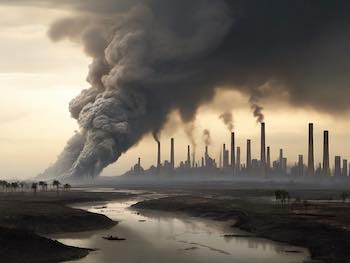The notion of the Anthropocene is at the heart of a brief by Pour la Science. What is its use? Has the Earth really changed era or is it an intellectual masturbation of the newest mosquitoes that inhabit it? The file contains 3 articles, 1 exciting framed by 2 fades.
Sommaire
Canned land at the Academy
1st article by Luc Semal, political scientist: What is the name of the Anthropocene? In summary, the Anthropocene is a useful notion because it awakens consciences, but geologists and stratigraphers have not frankly rallied to it. What to do with it in the end? Semal doesn’t know. His article weakens the symbolic value of the concept which he says is the main interest. Counterproductive.
Especially since the different positions mentioned are not as convincing. Geologists and stratigraphers divide their eras according to ecological and geological upheavals: mass extinctions of species, changes in relief, rising seas. None of their criteria correspond to the transformation of the planet by a species. Their hesitation in the face of the Anthropocene is academic, not factual. An upheaval is well underway.
If you are familiar with the double look, this hesitation must seem childish to you. The classical landmarks of geologists as well as the Anthropocene belong to the downward look. Planetary ontology, under the upward look, makes fun of differences. Processes that self-organize, stop on stable solutions, leave them when conditions change. If humans are responsible for the change, they can be likened to a cosmic catastrophe, an equivalent of the giant asteroid that led to the disappearance of the dinosaurs.
Breathtaking dismantling of the myth of transition
2nd article by Jean-Baptiste Fressoz, historian of science: Energy and raw materials, the myth of the transition. Burning! Read it in detail because here the upward look is sharp: it shows that human organizations, mines, industries, energy production, always follow the paths of ease and not any ideals. “Progress” has never replaced the consumption of some resources with others; they added up. The shoring of coal mines consumed more wood than its use for heating before the arrival of coal! Short-sightedness of our managers, lack of global level, the article is edifying.
Gardener or worshipper?
3rd article by François Sarrazin and Jane Lecomte, ecologists: Do we want a garden Earth? They pit a planet gardened for our own interests against a wild Earth, continuing to follow a natural evolution. We find this mixture of scientism and mysticism specific to contemporary ecology. Nature is sanctuarized and Evolution would be a divine process that should not be touched. Again, these are counterproductive ideas, not in themselves, but because of the place they are assigned in the hierarchy of priorities.
Small provocation: if Nature were able to self-administer, it would not have designed a species capable of destroying the entire ecosystem, would it? So we have to hope that we do better than it. Humans create new severe evolutionary pressures. Many species do not survive there. Others adapt. The numerous extinctions today correspond to the rapid change of the environment. As in any previous geological era. With resilience when conditions stabilize.
And the collapse of the anthroposystem?
We have more critical issues to deal with. Many humans do not survive the pressures of social evolution. Or in such precarious conditions that we must worry about the collapse of the anthroposystem before the ecosystem.
But the mismanagement that reigns today in terms of ecology, and from which this file of Pour la Science does not escape, is elsewhere: All the discourses presuppose that each of us is able to assimilate a rational presentation on the coming climate catastrophe, participate in the decisions that are necessary, and correct his behavior. Basically, we are asking the molecules of a collapsing wall to come together to stop the destruction.
If the safety plan starts by saying that there are 7 billion altruistic humans, there won’t be a single survivor. A small committee of altruists is enough, as long as they have the necessary power. Is the individual effort, in this case, to recover one’s small piece of power or to give it away?
Earthling, it’s hot…
Let us remember from the brief that to be an earthling, today, is to be embarked on a high-speed train without a pilot. Even with the AC it starts to get pretty hot inside. But the mobilization of the masses always concerns our little daily comforts. And why wouldn’t I have a place in 1st rather than in economy? It is true that these travelers with a very short existence will not see the definitive stop of the train in the middle of the desert…
*
See also:
Hierarchy synthesis
How to save the human from themselves?

